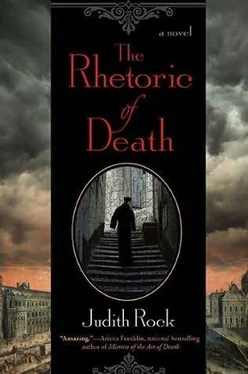Judith Rock - The Rhetoric of Death
Здесь есть возможность читать онлайн «Judith Rock - The Rhetoric of Death» весь текст электронной книги совершенно бесплатно (целиком полную версию без сокращений). В некоторых случаях можно слушать аудио, скачать через торрент в формате fb2 и присутствует краткое содержание. Жанр: Исторический детектив, на английском языке. Описание произведения, (предисловие) а так же отзывы посетителей доступны на портале библиотеки ЛибКат.
- Название:The Rhetoric of Death
- Автор:
- Жанр:
- Год:неизвестен
- ISBN:нет данных
- Рейтинг книги:3 / 5. Голосов: 1
-
Избранное:Добавить в избранное
- Отзывы:
-
Ваша оценка:
- 60
- 1
- 2
- 3
- 4
- 5
The Rhetoric of Death: краткое содержание, описание и аннотация
Предлагаем к чтению аннотацию, описание, краткое содержание или предисловие (зависит от того, что написал сам автор книги «The Rhetoric of Death»). Если вы не нашли необходимую информацию о книге — напишите в комментариях, мы постараемся отыскать её.
The Rhetoric of Death — читать онлайн бесплатно полную книгу (весь текст) целиком
Ниже представлен текст книги, разбитый по страницам. Система сохранения места последней прочитанной страницы, позволяет с удобством читать онлайн бесплатно книгу «The Rhetoric of Death», без необходимости каждый раз заново искать на чём Вы остановились. Поставьте закладку, и сможете в любой момент перейти на страницу, на которой закончили чтение.
Интервал:
Закладка:
“Maitre du Luc,” Beauchamps said into his hands. “Show him how it is done.”
Charles blinked. “Maitre?”
“You know the part,” Beauchamps said without looking up. “I saw your feet. Would you rather dance it for him or would you rather I kill him? Let us hear what Jesuit casuistry has to say to that proposition.”
“Please, Maitre du Luc, we have never seen a professor dance, not really!” the boys clamored.
“On the other hand, we have never seen a teacher kill one of us, either,” someone else said in an interested tone.
Charles wished he could disappear like Philippe. Everyone of his social class learned to dance, of course. And he was a good, even gifted, dancer, indeed had thought more than once when he was younger of running away to join a theatre company. But now he was a Jesuit, and while teaching was one thing, performing, even for these boys, was quite another. He hadn’t danced-not really danced-since the ball where his secret betrothal to Pernelle had been discovered.
“Well?” Beauchamps was glowering at Charles from under his eyebrows.
“Yes-I do-I did-know Monsieur Beauclaire’s part of this gigue. But you must excuse me, maitre, you know that Jesuits do not perform.”
“Nonsense. Is your Superior General going to drop through the ceiling and excommunicate you if you dance this gigue for us? You are a teacher. What I ask is part of teaching M. Beauclaire. So teach.”
“But, maitre, I can no longer position my left arm exactly as it should be and-”
“You have another arm and two legs, use those. We’ll get the idea.”
He positioned his fiddle and waited. Charles turned toward the front of the room to enlist Jouvancy’s help. The senior rhetoric master could put a more courteous stop to this than he himself could. But Jouvancy was busy demonstrating dance’s fourth position, a stance used by actors, lawyers-and most males having their portraits painted-as well as by dancers. As Charles watched, Jouvancy threw up his hands in exasperation and pulled off his cassock to stand in his linen shirt and black breeches, then struck the fourth position pose, his black stockinged legs and small feet in their low-heeled shoes turned out just so, his arms, hands, and fingers softly curved, his whole stance imbued with arresting, silent beauty. Charles shrugged and pulled off his own cassock. Jubilantly, the boys cleared the stage for him and he took up the gigue’s beginning position, wondering how much he really remembered. And what Beauchamps would do to him when he reached the end of his memory.
The dancing master gave him a nod, attacked the fiddle with the bow, and they were off. Charles plunged into the gigue like a hooked fish thrown back into water. He stepped, he leapt, he flew. He balanced on one foot’s tiptoe as though merely pausing during levitation. A wild joy possessed him. His feet invented effortless, flickering steps for what he’d forgotten. He pirouetted, flashing like a top as he spun. He wove a lover’s knot of a pattern on the ancient floorboards and sprayed his audience with sweat as he skimmed past them. When the fiddle achieved its finish, his blood and his heart went on singing. Grinning from ear to ear, he bowed to Beauchamps, who bowed in return, though with one raised eyebrow to mark Charles’s inspired improvisations.
The boys clapped wildly. As Jouvancy and his actors turned to see what was happening, Pere Montville, the rector’s assistant, burst into the room. For one startled moment, Charles thought Montville had come to censure him. But Montville hurried to Jouvancy and whispered urgently in his ear. Jouvancy blanched and grabbed up his cassock. Montville left as quickly as he’d come. Beauchamps and Charles looked questions at each other as Charles shrugged hastily back into his own cassock.
“Gather both casts, please,” Jouvancy said as he passed them, “work on the finale, the ballet general.”
He rushed from the room, his cassock billowing behind him. Seeing that Jouvancy had dropped his black cloth cincture, Charles grabbed it up. “I must take him this,” he told Beauchamps, and hurried after the rhetoric master.
Chapter 6
If Pere Montville’s news was about Philippe, Charles thought, running across the Cour d’honneur, then the news was obviously bad. He caught up with Pere Jouvancy in the postern passage and handed him the cincture. Jouvancy wound it around his waist without breaking stride.
“What is it, mon pere?” Charles said, walking beside him. “Can I help?”
Jouvancy shook his head. “It is my nephew.”
He pushed his way through the postern, which was blocked by a crowd of lay brothers looking out and talking excitedly. As Charles hesitated, torn between knowing that he should go back to the classroom and wanting to know what had happened to Philippe, a hand plucked at his sleeve.
“Down there.” Frere Fabre pointed at the narrow street that opened off St. Jacques almost straight across from the college. “The baker’s little girl said it happened down where the rue des Poirees turns.”
Charles threw a sop to his conscience, telling himself that Jouvancy might need him, and squeezed through the door into the street. Movement caught his eye and he glanced to his left, beyond the chapel’s street door, where a small girl was pointing anxiously toward the rue des Poirees as a man in a baker’s baglike cap held her firmly by the shoulder.
Charles followed Jouvancy into the shadows of the rue des Poirees, over its patchy and uneven cobbles toward the sharp left turn where Pere Montville and Pere Le Picart were bent over something hidden by their cassocks. To Charles’s surprise, Pere Guise was there, talking to a tall gaunt street porter with a loaded wooden carrying frame on his back. A small, round woman stood watching them, radiating indignation, even at a distance. Beyond the bend in the street, two lay brothers held back traffic, stolidly silent under a rain of abuse from riders, a carriage driver, and a dozen pedestrians, all determined to gain the rue St. Jacques without going the longer way around. Less encumbered pedestrians were starting to edge past the brothers along the house walls.
Jouvancy pushed his way through a knot of gesticulating university students and dropped to his knees between Montville and Le Picart. Charles, tall enough to see over their shoulders, hung back, wondering in confusion who the little boy lying on the pavement could be. He certainly was not Philippe, he looked almost too young to belong to the college at all. The boy lay ominously still and his eyes were closed. The rector was trying to stanch the blood pouring from a long cut on his forehead.
Not dead, Charles prayed silently. Dear Blessed Virgin, don’t let him be dead. Fabre and another brother arrived at a run with a board. As Jouvancy and Le Picart carefully lifted the boy onto it, his bony little chest rose and fell in a shallow breath and Charles released his own held breath in a prayer of thanks. The lay brothers lifted the board and started back to the college.
“Go back to the classroom,” Jouvancy said distractedly as he passed Charles, his eyes on the motionless child. “Keep them working. I won’t return today.”
Montville, on Jouvancy’s heels, stopped and laid a hand on Charles’s arm. “If you need help, Maitre du Luc, just ask any of us. I know you’ve hardly arrived.”
“You are most kind, mon pere. But I’m sure Maitre Beauchamps won’t let me put a foot wrong. Who is the child? What happened?”
“He is Antoine Doute, brother to the silly young bravo who ran away yesterday. The boys are Pere Jouvancy’s nephews.” He jerked his head at Guise. “And this little one is also Pere Guise’s godson. As for what happened here, well, it seems a little confused, but witnesses say that a horseman, probably drunk, knocked the child down.”
Читать дальшеИнтервал:
Закладка:
Похожие книги на «The Rhetoric of Death»
Представляем Вашему вниманию похожие книги на «The Rhetoric of Death» списком для выбора. Мы отобрали схожую по названию и смыслу литературу в надежде предоставить читателям больше вариантов отыскать новые, интересные, ещё непрочитанные произведения.
Обсуждение, отзывы о книге «The Rhetoric of Death» и просто собственные мнения читателей. Оставьте ваши комментарии, напишите, что Вы думаете о произведении, его смысле или главных героях. Укажите что конкретно понравилось, а что нет, и почему Вы так считаете.












